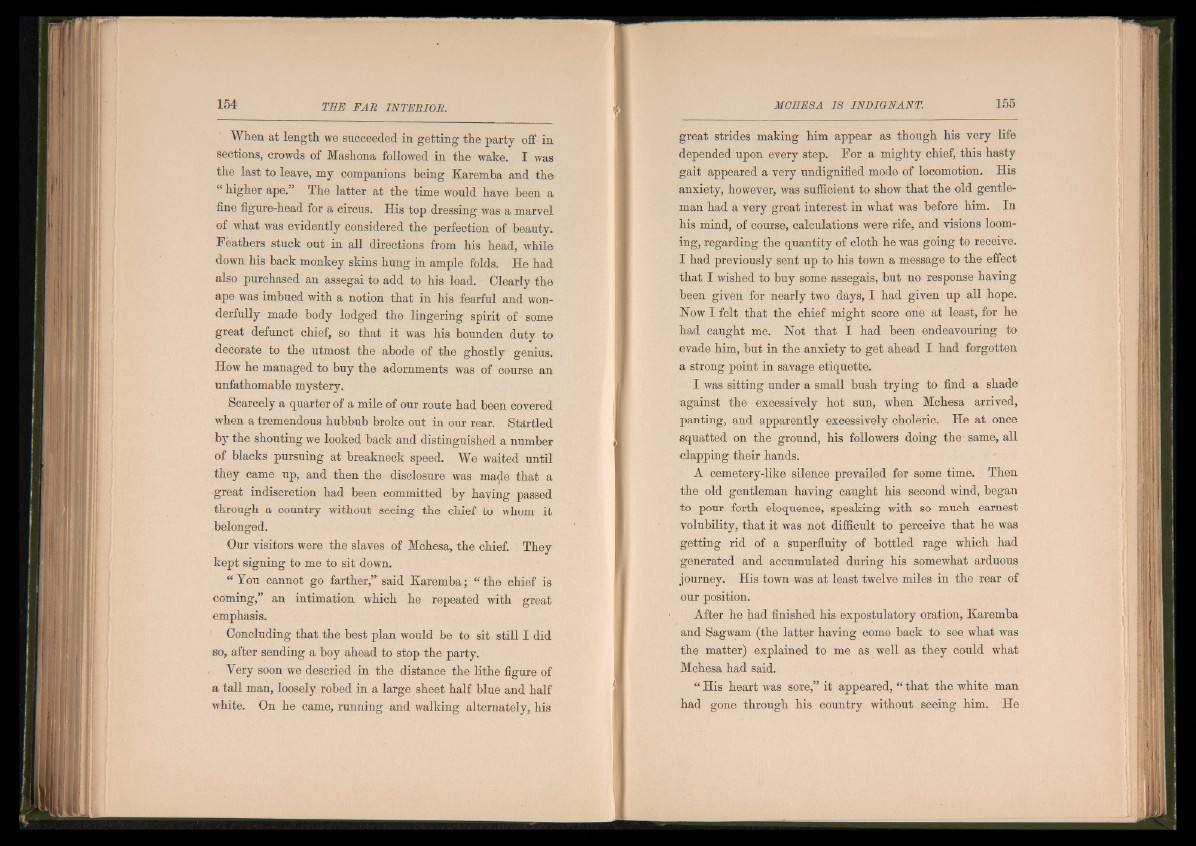
When at length we succeeded in getting the party off in
sections, crowds of Mashona followed in the wake. I was
the last to leave, my companions being Karemba and the
“ higher ape.” The latter at the time would have been a
fine figure-head for a circus. His top dressing was a marvel
of what was evidently considered the perfection of beauty.
Feathers stuck out in all directions from his head, while
down his back monkey skins hung in ample folds. He had
also purchased an assegai to add to his load. Clearly the
ape was imbued with a notion that in his fearful and wonderfully
made body lodged the lingering spirit of some
great defunct chief, so that it was his bounden duty to
decorate to the utmost the abode of the ghostly genius.
How he managed to buy the adornments was of course an
unfathomable mystery.
Scarcely a quarter of a mile of our route had been covered
when a tremendous hubbub broke out in our rear. Startled
by the shouting we looked back and distinguished a number
of blacks pursuing at breakneck speed. We waited until
they came up, and then the disclosure was made that a
great indiscretion had been committed by having passed
through a country without seeing the chief to whom it
belonged.
Our visitors were the slaves of Mchesa, the chief. They
kept signing to me to sit down.
“ You cannot go farther,” said Karemba; “ the chief is
coming,” an intimation which he repeated with great
emphasis.
Concluding that the best plan would be to sit still I did
so, after sending a boy ahead to stop the party.
Very soon we descried in the distance the lithe figure of
a tall man, loosely robed in a large sheet half blue and half
white. On he came, running and walking alternately, his
great strides making him appear as though his very life
depended upon every step. For a mighty chief, this hasty
gait appeared a very undignified mode of locomotion. His
anxiety, however, was sufficient to show that the old gentleman
had a very great interest in what was before him. In
his mind, of course, calculations were rife, and visions looming,
regarding the quantity of cloth he was going to receive.
I had previously sent up to his town a message to the effect
that I wished to buy some assegais, but no response having
been given for nearly two days, I had given up all hope.
Now I felt that the chief might score one at least, for he
had caught me. Not that I had been endeavouring to
evade him, but in the anxiety to get ahead I had forgotten
a strong point in savage etiquette.
I was sitting under a small bush trying to find a shade
against the excessively hot sun, when Mchesa arrived,
panting, and apparently excessively choleric. He at once
squatted on the ground, his followers doing the same, all
clapping their hands.
A cemetery-like silence prevailed for some time. Then
the old gentleman having caught his second wind, began
to pour forth eloquence, speaking with so much earnest
volubility, that it was not difficult to perceive that he was
getting rid of a superfluity of bottled rage which had
generated and accumulated during his somewhat arduous
journey. His town was at least twelve miles in the rear of
our position.
After he had finished his expostulatory oration, Karemba
and Sagwam (the latter having come back to see what was
the matter) explained to me as well as they could what
Mchesa had said.
“ His heart was sore,” it appeared, “ that the white man
had gone through his country without seeing him. He